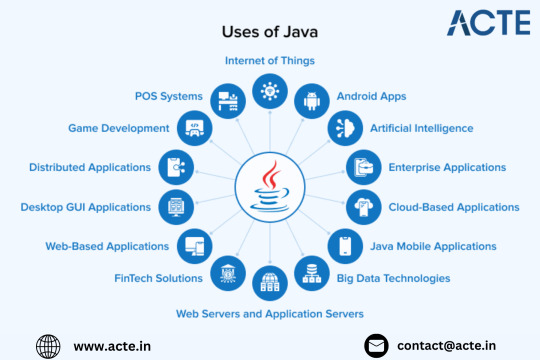#java online training
Explore tagged Tumblr posts
Text
Understanding Object-Oriented Programming and OOPs Concepts in Java
Object-oriented programming (OOP) is a paradigm that has revolutionized software development by organizing code around the concept of objects. Java, a widely used programming language, embraces the principles of OOP to provide a robust and flexible platform for developing scalable and maintainable applications. In this article, we will delve into the fundamental concepts of Object-Oriented Programming and explore how they are implemented in Java.

Object-Oriented Programming:
At its core, Object-Oriented Programming is centered on the idea of encapsulating data and behavior into objects. An object is a self-contained unit that represents a real-world entity, combining data and the operations that can be performed on that data. This approach enhances code modularity, and reusability, and makes it easier to understand and maintain.
Four Pillars of Object-Oriented Programming:
Encapsulation: Encapsulation involves bundling data (attributes) and methods (functions) that operate on the data within a single unit, i.e., an object. This encapsulation shields the internal implementation details from the outside world, promoting information hiding and reducing complexity.
Abstraction: Abstraction is the process of simplifying complex systems by modeling classes based on essential properties. In Java, abstraction is achieved through abstract classes and interfaces. Abstract classes define common characteristics for a group of related classes, while interfaces declare a set of methods that must be implemented by the classes that implement the interface.
Inheritance: Inheritance is a mechanism that allows a new class (subclass or derived class) to inherit properties and behaviors of an existing class (superclass or base class). This promotes code reuse and establishes a hierarchy, facilitating the creation of specialized classes while maintaining a common base.
Polymorphism: Polymorphism allows objects of different types to be treated as objects of a common type. This is achieved through method overloading and method overriding. Method overloading involves defining multiple methods with the same name but different parameters within a class, while method overriding allows a subclass to provide a specific implementation of a method that is already defined in its superclass.
Java Implementation of OOP Concepts:
Classes and Objects: In Java, a class is a blueprint for creating objects. It defines the attributes and methods that the objects of the class will have. Objects are instances of classes, and each object has its own set of attributes and methods. Classes in Java encapsulate data and behavior, fostering the principles of encapsulation and abstraction.
Abstraction in Java: Abstraction in Java is achieved through abstract classes and interfaces. Abstract classes can have abstract methods (methods without a body) that must be implemented by their subclasses. Interfaces declare a set of methods that must be implemented by any class that implements the interface, promoting a higher level of abstraction.
Inheritance in Java: Java supports single and multiple inheritances through classes and interfaces. Subclasses in Java can inherit attributes and methods from a superclass using the extends keyword for classes and the implements keyword for interfaces. Inheritance enhances code reuse and allows the creation of specialized classes while maintaining a common base.
Polymorphism in Java: Polymorphism in Java is manifested through method overloading and overriding. Method overloading allows a class to define multiple methods with the same name but different parameters. Method overriding occurs when a subclass provides a specific implementation for a method that is already defined in its superclass. This enables the use of a common interface for different types of objects.
Final Thoughts:
Object-oriented programming and its concepts form the foundation of modern software development. Java, with its robust support for OOP, empowers developers to create scalable, modular, and maintainable applications. Understanding the principles of encapsulation, abstraction, inheritance, and polymorphism is crucial for harnessing the full potential of OOPs concepts in Java. As you continue your journey in software development, a solid grasp of these concepts will be invaluable in designing efficient and effective solutions.
#javascript#javaprogramming#java online training#oops concepts in java#object oriented programming#education#technology#study blog#software#it#object oriented ontology#java course
3 notes
·
View notes
Text
Navigating Java's Promising Future: A Closer Look at the Ever-Expanding Horizons of Technology
In the fast-paced world of technology, Java stands tall as a resilient language with boundless potential. Its enduring significance and robust ecosystem position it as a cornerstone of software development across various domains. Let's explore the myriad factors that contribute to Java's promising trajectory in the evolving landscape of technology.

1. Unmatched Versatility and Reach
Java's versatility knows no bounds, making it a preferred choice for developers across diverse industries. From web and mobile app development to enterprise solutions and big data processing, Java's adaptability ensures a wide spectrum of career opportunities. Its widespread adoption and proven track record make it a dependable foundation for building scalable and resilient applications.
2. Thriving Ecosystem and Community Support
At the core of Java's success lies its thriving ecosystem and vibrant community. With a vast array of libraries, frameworks, and tools, the Java ecosystem empowers developers to streamline development processes and create cutting-edge solutions. Furthermore, the active Java community fosters collaboration and innovation, driving the language's evolution to new heights.
3. Platform Agnosticism
Java's renowned "write once, run anywhere" principle remains a key advantage in today's multi-platform landscape. Developers can craft Java applications that seamlessly operate across different platforms and devices, ensuring interoperability and accessibility. This platform-agnostic approach simplifies development efforts and broadens the reach of Java-powered solutions.
4. Dominance in Enterprise Solutions
Java continues to maintain its stronghold in the enterprise sector, powering critical systems for numerous Fortune 500 companies. Its reliability, scalability, and robust security features make it the preferred choice for building large-scale enterprise applications. As businesses increasingly rely on digital solutions, the demand for skilled Java developers remains steadfast, offering lucrative prospects in corporate environments.

5. Seamless Integration with Emerging Technologies
Java's adaptability extends to emerging technologies such as cloud computing, artificial intelligence, machine learning, and the Internet of Things (IoT). Leveraging Java's robust frameworks and libraries, developers can innovate and build solutions that harness the potential of these cutting-edge technologies. Java's compatibility with emerging trends ensures its relevance and longevity in a rapidly evolving tech landscape.
6. Continuous Evolution and Enhancement
The Java platform undergoes continual evolution to stay at the forefront of industry trends and technological advancements. With each new release, such as Java 15 and beyond, developers gain access to enhanced features, improved performance, and strengthened security measures. Java's commitment to innovation ensures its competitiveness and relevance in the dynamic software development sphere.
7. Focus on Performance Optimization
Performance optimization remains a top priority for Java developers, driving efforts to enhance the language's efficiency and speed. Through bytecode enhancements, garbage collection improvements, and runtime optimizations, Java delivers exceptional performance in diverse computing environments. This relentless focus on performance ensures that Java remains a top choice for resource-intensive applications.
8. Accessibility and Education Initiatives
Java's popularity extends beyond professional development, making it a cornerstone in educational institutions and training programs worldwide. Abundant resources, tutorials, and online courses enable aspiring developers to learn Java and embark on rewarding careers in software development. Java's widespread use in academia fosters a steady influx of new talent, enriching the industry with fresh perspectives and ideas.
In summary, Java's future looks promising, driven by its unparalleled versatility, robust ecosystem, enterprise dominance, integration with emerging technologies, continuous evolution, performance optimization, and accessibility initiatives. As Java continues to adapt and innovate, it will remain a vital force in software development for years to come.
2 notes
·
View notes
Text
Know what Java PriorityQueue is for?
youtube
#java#100daysofcode#coding is fun#java for beginners#java online training#javaprogramming#array#priority queue#Youtube
0 notes
Text
Java: The Timeless Technology - Why It Remains a Developer Darling
Java has established itself as a cornerstone in the realm of programming languages, maintaining its relevance and popularity for over two decades. For individuals who want to work in the sector, a respectable Top Java Course in Pune can give them the skills and information they need to succeed in this fast-paced atmosphere.

With its extensive applications and robust community, Java remains a favored choice among developers across various sectors. In this blog, we’ll delve into the compelling reasons why Java continues to be a top contender in the tech industry.
1. Platform Independence: A Key Advantage
One of Java's standout features is its platform independence, encapsulated in the mantra "write once, run anywhere." This means that Java code can be executed on any device equipped with a Java Virtual Machine (JVM), regardless of the underlying operating system. This capability is crucial for developers looking to create cross-platform applications, allowing them to write code that runs seamlessly on Windows, macOS, and Linux environments. For businesses, this translates to reduced development costs and time since there is no need to maintain separate codebases for different platforms.
2. Strong Community Support: A Vital Resource
Java is backed by a vast and vibrant community of developers who contribute to its ongoing evolution and support. This robust community fosters a rich ecosystem of resources, libraries, and frameworks that can significantly streamline development tasks. From forums and user groups to comprehensive documentation and tutorials, developers can easily find assistance and share knowledge. Notably, popular frameworks like Spring and Hibernate have emerged from this collaborative environment, providing developers with powerful tools to build scalable and efficient applications.
3. Robustness and Security: A Foundation for Trust
Java's design emphasizes robustness and security, making it an ideal choice for developing reliable applications. The language incorporates strong type-checking mechanisms that help prevent type-related errors during runtime, while its automatic garbage collection minimizes the risk of memory leaks and enhances application stability. Moreover, Java's built-in security features, such as the security manager and bytecode verification, protect applications from various security threats and vulnerabilities. This focus on stability and security is especially critical in industries such as finance, healthcare, and government, where reliability is paramount.
4. Versatile Application Development: A Wide Range of Use Cases
Java's versatility enables it to be employed across diverse domains and application types. Whether developing enterprise-level applications using robust frameworks like Spring or creating mobile applications for Android devices, Java is well-suited for a broad spectrum of development projects. Its object-oriented programming paradigm promotes code reusability and maintainability, making it easier to manage complex systems. Additionally, Java is increasingly utilized in emerging fields such as big data and cloud computing, empowering developers to remain relevant in a rapidly changing technological landscape.
Consider enrolling in the Java Online Certification Training to fully harness Java's capabilities and become proficient in web automation.

5. Strong Job Market: A Stable Career Choice
The demand for Java developers is consistently high, reflecting the language's pivotal role in the software industry. Many organizations depend on Java for their mission-critical applications and systems, resulting in a steady influx of job opportunities for skilled developers. Industry reports frequently rank Java among the top programming languages in job postings, making it a strategic investment for anyone seeking to enter or advance in the tech field. Furthermore, Java developers often enjoy competitive salaries and promising career growth prospects, underscoring the language's enduring value.
6. Continuous Evolution: Adapting to Modern Needs
Java’s commitment to continuous evolution is critical in today’s fast-paced tech environment. The language undergoes regular updates and releases that introduce new features and enhancements, ensuring its relevance. The Java Community Process (JCP) actively involves developers in the decision-making process, aligning the language's evolution with industry trends and user needs. Recent advancements, such as lambda expressions, the introduction of the module system, and performance improvements, demonstrate Java's adaptability to modern programming paradigms, keeping it a competitive choice for developers.
7. Rich Ecosystem of Frameworks and Tools
The Java ecosystem is rich with frameworks and tools that facilitate and accelerate development processes. Prominent frameworks like Spring, Hibernate, and JavaServer Faces (JSF) offer powerful solutions for building web applications, managing databases, and developing robust backend systems. Additionally, integrated development environments (IDEs) such as IntelliJ IDEA, Eclipse, and NetBeans provide developers with advanced features for coding, debugging, and testing, ultimately enhancing productivity and the quality of code produced.
8. Abundant Learning Resources: A Developer’s Playground
Another significant advantage of Java is the vast array of learning resources available to developers. From comprehensive online courses and interactive tutorials to textbooks and coding bootcamps, aspiring developers have access to an extensive range of materials to facilitate their learning journey. Many educational platforms also offer certification programs that further enhance a developer's credentials, making them more appealing to potential employers and boosting their career prospects.
9. Strong Performance and Scalability
Java is known for its robust performance capabilities, making it suitable for high-traffic applications and large-scale systems. The JVM optimizes the execution of Java applications, allowing for efficient memory management and execution speed. This performance reliability is essential for enterprises that require scalable solutions to accommodate growing user bases and increasing data loads.
10. Integration Capabilities: A Seamless Connection
Java excels in integrating with other technologies and systems, making it an excellent choice for building complex applications. Its interoperability with various programming languages, databases, and platforms allows developers to create comprehensive solutions that leverage existing technologies. This capability is particularly beneficial in enterprise environments where different systems need to work together seamlessly.
Conclusion
In summary, Java remains a premier choice for developers due to its enduring reliability, versatility, and robust community support. Whether you’re just starting your programming journey or looking to advance your skills further, investing in Java can open numerous doors in the tech industry. Its consistent relevance, strong job market, extensive ecosystem, and commitment to innovation make Java a powerful ally for developers eager to tackle the challenges of modern software development. With Java, the possibilities are vast, and the future looks bright for anyone willing to embrace this timeless programming language.
0 notes
Text

Embark on a transformative journey from a Java novice to a proficient programmer in this comprehensive masterclass. Master the fundamentals of Java, explore object-oriented programming concepts, and delve into advanced topics like data structures, algorithms, and design patterns. By the end of this course, you'll be equipped with the skills and knowledge to tackle real-world Java programming challenges.
0 notes
Text
Is ShapeMySkills the best Java Training Institute in Noida?
Yes, ShapeMySkills is the best for summer training. I also have completed my Java course at this training institute. Their counselors have friendly behavior and their trainers are industry experts and have lots of knowledge. Right now my friends are learning Digital Marketing and Java from this Institute.
0 notes
Text
https://cyonit.in/web-stories/uses-of-javascript/
#java#java jobs#javascript#java course#coding#java developers#java online course#java online training
0 notes
Text
Navigating the World of Java Training and Placement: A Comprehensive Guide
Java remains a cornerstone programming language, powering a myriad of applications and systems across industries. As businesses increasingly adopt Java-based solutions, the demand for skilled Java developers continues to surge. Consequently, individuals seeking to enter or advance in the field of software development often find themselves drawn to Java training programs.
Java training courses not only equip learners with essential programming skills but also provide avenues for securing lucrative job placements. In this comprehensive guide, we delve into the realm of Java training and placement, exploring the key aspects, benefits, and considerations for aspiring Java developers.

Understanding Java Training
Java training programs encompass a wide range of courses tailored to suit various skill levels, from beginners to experienced developers. These courses typically cover fundamental concepts such as syntax, data types, control flow, object-oriented programming principles, and advanced topics like multi threading, networking, and database connectivity.
Whether offered through traditional classroom settings or online platforms, Java training modules are designed to provide hands-on experience through practical exercises, projects, and assessments. Moreover, many training programs incorporate real-world scenarios and industry-relevant projects to simulate the challenges faced by Java developers in professional settings.
Benefits of Java Training
Versatility: Java's versatility enables developers to create applications ranging from web and mobile apps to enterprise software and embedded systems. By mastering Java through training programs, individuals gain the skills to tackle diverse projects across various domains.
Career Opportunities: Java developers are in high demand across industries, including finance, healthcare, e-commerce, and telecommunications. Completing a Java training program significantly enhances one's employability, opening doors to a multitude of job opportunities with competitive salaries and benefits.
Industry Relevance: Java remains one of the most widely used programming languages globally, with a vast ecosystem of frameworks, libraries, and tools. Training in Java ensures that developers stay relevant in the ever-changing tech industry and are equipped to adapt to new advancements and challenges.
Community Support: The Java community is vibrant and expansive, comprising seasoned professionals, enthusiasts, and experts willing to share knowledge, resources, and best practices. Engaging with the Java community fosters continuous learning and networking opportunities, enriching the training experience.
Choosing the Right Java Training Program
With a plethora of Java training course available, selecting the right program can be daunting. Consider the following factors to make an informed decision:
Curriculum: Evaluate the course curriculum to ensure it covers essential Java concepts comprehensively, including both foundational and advanced topics. Look for programs that offer hands-on projects and assignments to reinforce learning.
Instructor Expertise: Research the credentials and experience of the instructors leading the training program. Experienced instructors with industry expertise can provide valuable insights and mentorship throughout the learning journey.
Learning Format: Determine whether the training program offers flexibility in terms of learning format, such as self-paced online courses, instructor-led classes, or blended learning options. Choose a format that aligns with your learning preferences and schedule.
Reviews and Testimonials: Read reviews and testimonials from past participants to gauge the effectiveness and quality of the training program. Positive feedback from alumni indicates the program's credibility and success in preparing individuals for Java-related roles.
Certification and Accreditation: Consider whether the training program offers certifications or accreditation recognized by industry leaders and employers. A certification from a reputable institution enhances your credibility and marketability as a Java developer.
Placement Assistance and Career Support
Many Java training programs offer placement assistance and career support services to help graduates secure job opportunities post-training. These services may include:
Resume Building: Assistance in crafting a professional resume tailored to highlight your Java skills, projects, and achievements.
Interview Preparation: Guidance and mock interview sessions to prepare you for technical interviews, coding assessments, and behavioral interviews commonly conducted by employers.
Job Placement Services: Access to job boards, recruitment networks, and partnerships with companies seeking Java developers. Some training providers may facilitate direct referrals and job placements based on your skills and preferences.
Alumni Network: Joining an alumni network of fellow Java developers who have completed the training program can provide valuable connections, mentorship, and job referrals throughout your career.
Final Thoughts:
In the competitive landscape of software development, acquiring proficiency in Java through comprehensive training programs is instrumental in securing rewarding career opportunities. By investing in Java training and placement services, individuals can embark on a fulfilling journey towards becoming skilled Java developers, equipped to thrive in the dynamic tech industry.
Whether you're a novice programmer looking to kickstart your career or an experienced developer seeking to upskill and advance, Java training programs offer the knowledge, resources, and support needed to achieve your goals. With dedication, perseverance, and the right training program, you can embark on a successful career path in Java development, making meaningful contributions to the world of technology.
#java online training#javascript#javaprogramming#javatpoint#coding#javatutorial#software#technology#education#it#study blog
0 notes
Text
The Many Uses of Java: A Comprehensive Overview
Java, a programming language celebrated for its portability, scalability, and robustness, stands out as a crucial tool in the software development landscape.
Enrolling in a Java Course in Pune significantly enhances one’s ability to leverage Java’s capabilities effectively. Understanding its primary advantages is crucial for developers and businesses considering its adoption.

Its flexibility allows it to be used across a variety of domains, making it a preferred choice for developers and organizations alike. In this blog, we’ll delve into the primary areas where Java is utilized and discuss its impact and significance in each field.
1. Web Development
Java is a key player in web development, enabling the creation of dynamic, interactive web applications. Its extensive frameworks, such as Spring, JavaServer Faces (JSF), and Struts, are essential for building powerful web solutions. The language’s ability to handle complex processes and high traffic volumes makes it ideal for large-scale web projects.
Example in Practice: Leading e-commerce sites like Amazon and eBay depend on Java to manage their complex web applications and accommodate substantial user traffic effectively.
2. Enterprise Solutions
When it comes to enterprise applications, Java is the go-to language for developing large-scale business systems. Java Enterprise Edition (Java EE) offers a broad set of tools and libraries for creating enterprise-grade solutions, including customer relationship management (CRM) and enterprise resource planning (ERP) systems.
Example in Practice: Major financial institutions and large enterprises utilize Java for their critical business applications, benefiting from its reliability and scalability.
3. Mobile Development
Java plays a significant role in mobile app development, especially within the Android ecosystem. It is the primary language used for creating Android applications, although Kotlin is also popular. Java’s robustness and versatility make it a foundational language for developing a wide range of mobile apps.
Example in Practice: Prominent apps like LinkedIn and Uber were initially developed using Java, showcasing its effectiveness in mobile app development.
4. Desktop Software
Java is also used to develop cross-platform desktop applications. With libraries like JavaFX and Swing, developers can build graphical user interfaces (GUIs) that function across different operating systems. This cross-platform capability ensures that applications can reach a broad audience. Consider enrolling in the Java Online Certification Training to fully harness Java’s capabilities and become proficient in web automation.

Example in Practice: IntelliJ IDEA, a widely-used integrated development environment (IDE), is a notable example of a desktop application developed in Java.
5. Scientific and Research Computing
In scientific and research fields, Java’s performance and portability are crucial for handling complex computations and simulations. Its capabilities make it suitable for applications requiring detailed mathematical analysis and extensive data processing.
Example in Practice: Java is employed in research projects that demand high performance, such as simulations and analytical tools used in scientific studies.
6. Embedded Systems
Java extends its reach into embedded systems, where it is used in devices such as smart cards, sensors, and Internet of Things (IoT) devices. Java ME (Micro Edition) is specifically designed for these resource-constrained environments, providing a lightweight platform for developing applications.
Example in Practice: Java is integral to various consumer electronics and industrial applications, demonstrating its versatility in embedded systems.
7. Cloud Computing
In the realm of cloud computing, Java remains a popular choice for building scalable and reliable cloud-based applications. Its strength in managing large volumes of data and handling complex tasks makes it well-suited for cloud environments.
Example in Practice: Cloud platforms like Amazon Web Services (AWS) and Google Cloud Platform offer Java-based solutions, reflecting its importance in cloud computing.
8. Big Data
Java is influential in the big data space, where it is used in technologies like Apache Hadoop and Apache Spark. These frameworks, vital for processing and analyzing large datasets, are built with Java and support various big data applications.
Example in Practice: Java’s role in big data technologies enables efficient management and analysis of large-scale data across different industries.
Conclusion
Java’s versatility and robust feature set make it applicable in numerous fields, from web and enterprise development to mobile apps, embedded systems, and big data technologies. Its enduring relevance highlights its importance in creating scalable and efficient solutions. Whether you’re working on a web application, mobile app, or enterprise system, Java’s adaptability and reliability make it an essential language in the software development toolkit.
0 notes
Text
Why not to use Java Vector?
youtube
#java#100daysofcode#coding is fun#java for beginners#java online training#javaprogramming#array#vector#Youtube
0 notes
Text
youtube
#online courses#coding#graphic designing#web design#ict skills#india#hindi#gujarati#english#www.ictskills.in#online training#live training#full stack course#digital marketing#ui ux design#backend#online#live courses#courses#education#computer science#engineering#java#python#php#dot net development company#spring mvc#javascript#Youtube
2 notes
·
View notes
Text
Java Training institute in Hyderabad
RS Trainings: The Premier Path for Java Training in Hyderabad
If you're looking to master Java, one of the most popular and versatile programming languages in the world, RS Trainings in Hyderabad stands out as the premier destination for high-quality education. Renowned for its comprehensive curriculum and expert instructors, RS Trainings offers an unparalleled learning experience for both beginners and experienced developers looking to enhance their skills.

Why Choose RS Trainings for Java?
Industry-Experienced Instructors: At RS Trainings, courses are taught by seasoned IT professionals with extensive industry experience. These experts bring real-world insights into the classroom, ensuring that students not only learn theoretical concepts but also understand their practical applications.
Comprehensive Curriculum: The Java training program at RS Trainings is meticulously designed to cover all aspects of Java programming. Starting with the basics, the curriculum delves into advanced topics such as multithreading, collections, frameworks like Spring and Hibernate, and web development. This structured approach ensures that students develop a strong foundation and progressively build their expertise.
Hands-On Learning: RS Trainings emphasizes hands-on practice, which is crucial for mastering Java. Through numerous coding exercises, projects, and real-life case studies, students gain practical experience that prepares them for the challenges of the IT industry.
Personalized Attention: With small class sizes, RS Trainings ensures that each student receives personalized attention. Instructors are readily available to answer questions, provide feedback, and offer guidance, fostering a supportive learning environment.
State-of-the-Art Facilities: Located in Hyderabad, RS Trainings boasts modern facilities equipped with the latest technology. This provides an optimal setting for learning and practicing Java programming.
Placement Assistance: One of the key benefits of enrolling in RS Trainings is the robust placement assistance provided to students. The institute has a strong network of industry connections and a dedicated placement cell that helps students secure jobs in top IT companies.
Flexible Learning Options: Understanding the diverse needs of students, RS Trainings offers flexible learning options, including classroom training, online courses, and weekend batches. This flexibility ensures that even working professionals can find a suitable schedule to upgrade their skills.
Course Highlights
Introduction to Java: Learn the fundamentals of Java, including syntax, data types, and object-oriented programming principles.
Advanced Java Concepts: Explore advanced topics such as JDBC, Servlets, JSP, and EJB.
Frameworks: Gain proficiency in popular Java frameworks like Spring, Hibernate, and Struts.
Web Development: Develop web applications using Java technologies.
Project Work: Work on real-world projects that simulate actual industry scenarios.
Testimonials
Many students have benefited from the comprehensive Java training at RS Trainings. Here's what some of them have to say:
Priya R.: "The Java course at RS Trainings was exceptional. The instructors are very knowledgeable, and the hands-on projects helped me understand complex concepts. Thanks to their placement support, I landed a job at a top IT company."
Rahul S.: "RS Trainings provides the best learning environment. The curriculum is up-to-date with industry standards, and the practical approach to teaching made a huge difference in my career."
Conclusion
RS Trainings in Hyderabad is undoubtedly the best path for anyone looking to learn Java. With its expert instructors, comprehensive curriculum, hands-on approach, and excellent placement support, RS Trainings ensures that students are well-equipped to thrive in the competitive IT industry. Whether you are a novice or an experienced programmer, RS Trainings can help you achieve your career goals in Java programming.
#java training in Hyderabad#java online training#java course online#java training center#java training with placement#java frameworks training#core java training#java advanced topics#java course with placement
0 notes
Text
Boost Your Career with Java Online Training in Bangalore
In today's competitive job market, it's imperative to stay ahead of the curve and equip yourself with the right skills. If you're looking to enhance your career prospects and dive into the world of programming, then java online training in Bangalore is your gateway to success. Let's explore how this comprehensive program can open doors to new opportunities.
Master Java: The Universal Language of Coding
Java Full Stack Training: Your Path to Excellence
Java is one of the most versatile and widely used programming languages globally, making it a must-learn skill for aspiring developers. Its flexibility, portability, and compatibility across various platforms have made it a universal language of coding.
With Java Full Stack training in Bangalore, you will not only learn the fundamentals of Java but also gain expertise in the entire software development stack. This comprehensive approach prepares you to excel in various roles, from front-end development to back-end engineering.
Why Choose Java Online Training?
1. In-Depth Learning
Java online training in Bangalore offers an in-depth curriculum that covers every aspect of Java programming. You'll delve into object-oriented programming, data structures, algorithms, and more, equipping you with a solid foundation for software development.
2. Hands-On Experience
The best way to learn is by doing. Our Java Full Stack training provides hands-on experience through real-world projects and practical exercises. You'll gain valuable insights and skills that can be directly applied to your work.
3. Industry-Relevant Skills
Stay updated with the latest industry trends and practices. java full stack training in bangalore ensures that you learn the most relevant technologies and tools that are currently in demand.
4. Expert Guidance
Our experienced instructors are here to guide you throughout your learning journey. They will answer your queries, provide feedback, and ensure you have a seamless learning experience.

Unleash Your Potential with Java Full Stack Training
Java Full Stack training in Bangalore is your ticket to a promising career in software development. By mastering Java, you'll be well-prepared to create dynamic web applications, design user-friendly interfaces, and optimize website performance.
Transition to a Bright Future
Java Full Stack training equips you with the skills needed to transition into various roles in the IT industry. Whether you aspire to be a front-end developer, back-end engineer, or a full-stack developer, this training program will provide you with the versatility to excel in your chosen field.
Conclusion
Investing in Java Full Stack training in Bangalore is an investment in your future. As you embark on this learning journey, you're not just gaining knowledge; you're unlocking a world of opportunities. Be ready to code your way to success and elevate your career to new heights.
0 notes
Text
Mastering Java: A Comprehensive Online Training Experience
"Embark on a transformative learning journey with our Java Online Training program. Whether you're a beginner looking to build a solid foundation or an experienced developer aiming to enhance your Java skills, our comprehensive training provides a dynamic and interactive experience.
Our expert instructors guide you through the fundamentals of Java programming, covering topics such as syntax, object-oriented programming, data structures, and algorithms. As you progress, you'll delve into advanced concepts like multithreading, networking, and GUI development, gaining the proficiency needed to tackle real-world projects.
With hands-on exercises, real-world examples, and collaborative projects, our Java Online Training ensures that you not only understand the theory but also develop practical coding skills. Stay ahead in the rapidly evolving tech landscape by mastering Java, a versatile and widely-used programming language.
Key Features:
Comprehensive curriculum covering Java fundamentals to advanced topics
Hands-on coding exercises for practical skill development
Real-world examples and case studies
Interactive learning environment with live sessions
Experienced instructors with industry expertise
Flexibility with self-paced modules
Networking opportunities with fellow learners
Whether you're aspiring to be a Java developer, looking to advance your career, or aiming to stay competitive in the tech industry, our Java Online Training is designed to empower you with the knowledge and skills needed to succeed. Join us and unlock the doors to a world of Java programming possibilities.
0 notes
Text
Java is a versatile and powerful programming language that maintains its position as a top choice among developers across the globe. For beginners seeking to excel in the world of programming, embarking on a Java training program is an informed choice. The following step-by-step guide guarantees a smooth initiation, covering vital aspects of Java training.
Starting with the basic concepts like variables and syntax, enrolment in reputed institutes offering Java training in Noida or elsewhere with experienced trainers and engagement in practical projects form the foundation. Further, proficiency in object-oriented programming, discovery of Java APIs, debugging skills, and staying up-to-date on the latest versions play a significant role in comprehensive learning experiences. Therefore, navigating through all these major aspects empowers beginners with the necessary skills for thriving in the constantly evolving IT industry.

#Java Training in Noida#Java Course in Noida#Java Training in delhi#Java online Training#Java online Course
0 notes
Text
2 notes
·
View notes